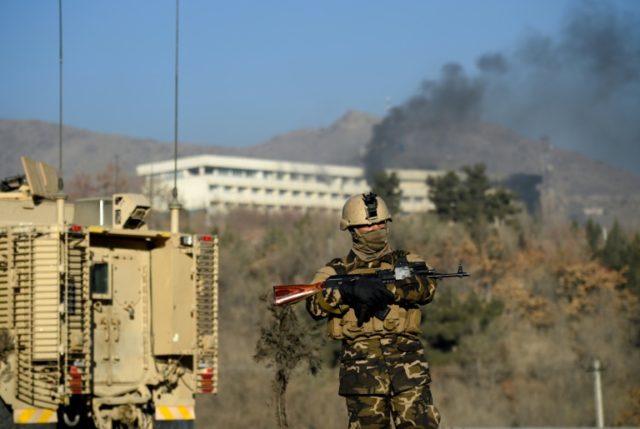Afghanistan has provided what it claims to be proof to Islamabad that the Islamic State (ISIS/ISIL) and Taliban attackers who killed about 200 people on Afghan soil over the last month trained and planned the assaults in Pakistan.
The Associated Press (AP) reports:
The Afghan officials said some of the latest evidence came from confessions by captured militants. They said they told the Pakistani side that some of the militants had been trained at Islamic seminaries in the Pakistani border town of Chaman.
Earlier in the week, Afghanistan’s U.N. envoy Mahmoud Saikal tweeted that the father of one of the insurgents involved in the bloody Jan. 20 assault on Kabul’s Intercontinental Hotel “conceded his son was trained in Chaman” by Pakistan’s InterServices Intelligence [ISI].
Echoing the Pentagon, Wais Ahmed Barmak, the interior minister in Afghanistan, also unveiled evidence, including confessions, that purportedly show Pakistan allows Taliban leaders to “roam freely” on its territory, notes AP.
On Thursday, Barmak and Afghanistan’s spy chief Masoom Stanekzai spoke to reporters, saying Afghanistan handed “undeniable” evidence to Pakistan showing that the recent spate of attacks was planned on Pakistani soil, reports the Agence France-Presse (AFP) news agency.
The attacks, which reportedly killed about 200 people, were apparently “planned from across the border,” declared Stanekzai, adding, “We asked Pakistan to hand over the culprits of the attacks in Afghanistan, and we shared undeniable evidence that the attacks were planned there.”
Afghanistan’s interior minister told reporters Kabul presented evidence to Pakistan during a meeting in Islamabad on Wednesday.
The Pakistani embassy in Kabul said the evidence provided by Afghan spy chief Stanekzai was “being examined for its authenticity.”
“Pakistan has not given any commitment to give [a] reply to the information received from the NDS [National Directorate of Security] Chief Mohammad Masoom Stanekzai,” the embassy said in a statement, reports TOLO News.
Islamabad has reportedly condemned the recent deadly attacks in Afghanistan.
During a visit to the Islamabad-based Afghan embassy, Pakistani Foreign Minister Khawaja Asif said his country “strongly condemns terrorism in all forms and manifestations,” points out AFP.
He added that, during Wednesday’s bilateral meeting, the two countries “agreed to work together to strengthen mutual trust and bilateral engagement.”
The revelations that the recent attackers planned the deadly assaults in Afghanistan from Pakistan come as the U.S.-NATO mission recently conceded that the Taliban continues to expand its influence in Afghanistan where it now controls or contests about 45 percent of the country.
Late last year, the United Nations also reported that the Taliban’s rival—the Islamic State branch in Afghanistan known as the Khorasan province (ISIS-K)—is growing and has extended its jihadi tentacles to seven provinces in recent months.
“Nearly 200 people have been killed over the past month in attacks claimed by the Taliban and a rival Islamic State [IS] affiliate,” reports AP.
U.S. President Donald Trump’s administration is expected to suspend about $2 billion in security aid to Islamabad over Pakistan’s reluctance to take decisive action against jihadists who operate on its soil and are fighting against American troops and their allies in Afghanistan, namely the Afghan Taliban and its al-Qaeda-linked ally, the Haqqani Network.
In its most recent assessment of the more than 16-year-old Afghanistan war issued in December, the Pentagon notes that Pakistan remains a “sanctuary” for terrorists, adding:
The Afghanistan-Pakistan border region remains a sanctuary for various groups, including al- Qa’ida, al-Qa’ida in the Indian Subcontinent (AQIS), the Haqqani Network, Lashkar-e- Tayyiba, Tehrik-e-Taliban Pakistan (TTP), ISIS-K, and the Islamic Movement of Uzbekistan.
Sanctuary on the Pakistani side and presence on the Afghan side remain security challenges for both countries and pose a threat to regional security and stability.
The Pentagon considers the Haqqani Network, blamed for at least one of the recent deadly attacks in Afghanistan, to be the primary threat facing U.S. troops and their allies.
Islamabad has repeatedly denied that it harbors jihadist, but it has acknowledged that it holds some influence over the Afghan Taliban.
Afghanistan and Pakistan have long accused one another of supporting terrorists.
The Afghanistan-Pakistan region is home to “the highest regional concentration of terrorist groups in the world,” the Pentagon report noted.
According to its latest quarterly report to Congress, the U.S. Special Inspector General for Afghanistan Reconstruction (SIGAR), the Trump administration’s record number of airstrikes have failed to increase Kabul’s control over Afghan territory.

COMMENTS
Please let us know if you're having issues with commenting.